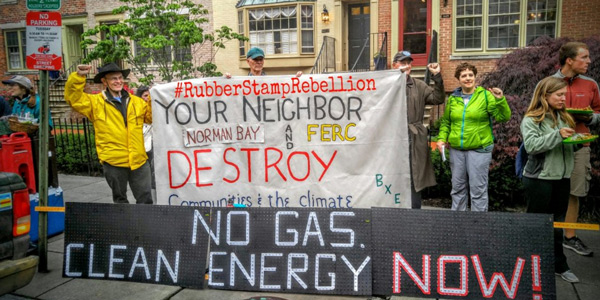By Rich Heidorn Jr.
WASHINGTON — Environmental activists opposing fracking and pipeline expansions regularly disrupted FERC meetings during Norman Bay’s two-and-a-half-year tenure as a FERC commissioner and chairman. On at least one occasion, activists took their protests to the street outside Bay’s D.C. house.
The activists contended FERC was shirking its responsibility by failing to consider whether the commission’s approvals of interstate natural gas pipelines were resulting in increased emissions. FERC has long insisted that such concerns are beyond its authority, as it doesn’t regulate the production of natural gas — a responsibility held by the states and the Interior Department.
But as it turned out, Bay had some misgivings about the commission’s legalistic reading.
In a five-page statement accompanying the commission’s ruling approving a 99-mile pipeline through Pennsylvania and New York on his last day in office, Bay gave his perspective on the impact of the shale gas revolution, lauding it for helping reduce electricity prices and carbon emissions but expressing concern about methane emissions and the potential for pipeline overcapacity (CP15-115).
Although it is not required to do so by the National Environmental Policy Act, Bay called on the commission to “analyze the environmental effects of increased regional gas production from the Marcellus and Utica” shale regions.
“Despite the growing importance of Marcellus and Utica gas production — it was 22.5 Bcfd in 2016 and is projected to surpass 44 Bcfd by 2050 — the commission has never conducted a comprehensive study of the environmental consequences of increased production from that region,” Bay noted. He said FERC should consider “the downstream impacts of the use of natural gas and … a life-cycle greenhouse gas emissions study.”
“As important as infrastructure development is,” he said, “it must also occur through processes that continue to promote public participation, transparency and confidence.”
Bay also said the commission should consider its reliance on signed agreements with shippers to determine the need for pipelines.
While these “precedent agreements” are useful indicators of need, Bay said the commission should also consider whether capacity is needed to ensure deliverability to power generators, reliability benefits and concerns “that anticipated markets may fail to materialize.”
He noted that LNG import terminals built during the early 2000s became stranded as shale gas largely eliminated the need for imports. “Overbuilding may subject ratepayers to increased costs of shipping gas on legacy systems. If a new pipeline takes customers from a legacy system, the remaining captive customers on the system may pay higher rates,” he said.
Bay — who resigned effective Feb. 3 after President Trump replaced him with Commissioner Cheryl LaFleur as acting chair — also had a parting shot at the minimum offer price rule in capacity markets. (See Bay Blasts MOPR on Way Out the Door.)





